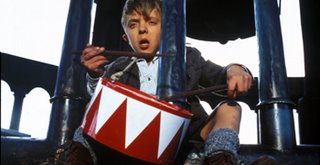The Tin Drum

The Tin Drum, the German novel by the Nobel prize winner Gunter Grass, is one of my all time favourite novels. It features one of the most extraordinary first-person narrators ever -- the "dwarf" Oskar Matzerath who recounts his story from a mental asylum. His narrative voice is what gives the novel its strange artistic power. It is darkly satirical and also fantastical, as if it were some kind of a grotesque fairy tale. But fairy tale it certainly is not. Rather, it is actually a dark tale of indictment of the role of German society and of ordinary men and women in the rise of National Socialism and their easy forgetfulness of their guilty past in the post-war economic miracle.
Okay, all of this because I watched the Volker Schlondorff's film adaptation of the novel last evening. The good folks at collective chaos film society are organising a short festival of films which have won Golden Palms at the Cannes film festival (so more posts are in the offing). I had seen the film before but I didn't remember all the details from the book or the film so went ahead.
The film is a very faithful adaptation of the book, although it handles only one half and in doing that it already clocks almost two and half hours of running time. Now making a faithful adaptation in this case in not as straightforward as it would seem because the book relies on so many over-the-top set pieces. Schlondorff's literalist approach to all those Rabelaisian scenes actually works in this case. So we see in the first scene of the film, how the narrator's mother was conceived in a potato field when his grandmother hid his to-be grandfather inside her "four skirts"! Although we never learn of the smell of rotten butter which is ubiquitous in the book. Or the scene where Oskar recounts his experience of coming out of his mother's womb or where he is made to drink the "evil soup" or the "muff diving" scene with the young Oscar (okay, in this case it is more vivid than in the book!). And the secret about the white powder is not revealed even in the film. Whatever it is, the scenes are quite erotic. And yes the most powerful scene involving eels and a horse's head. Cautionary warning here: If you are enthusiastic about eels or are ignorant of where they come from, don't read the book or watch the movie!
The film is of course a commendable piece of work but I think it would work better as an effective companion piece to the book rather than in independent work. Which is I think, exactly what a literary adaptation should aim to achieve.
This is a short essay on the film. Posters and stills from the film here.
2 comments:
The child actor in the movie is great. He actually looks like a big man trapped in a small body. His love affairs are also quite romantic :)
I would prefer to call it "erotic" rather than "romantic" !!
Post a Comment